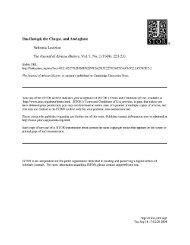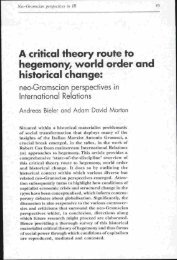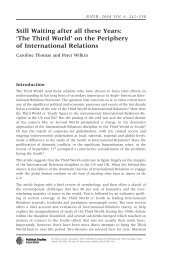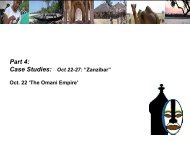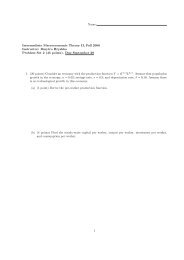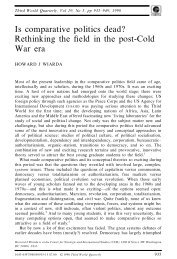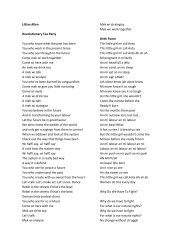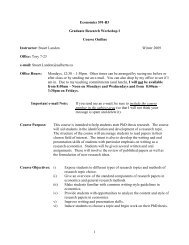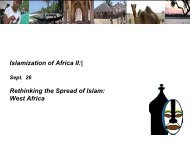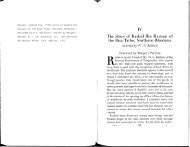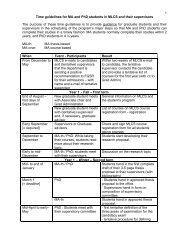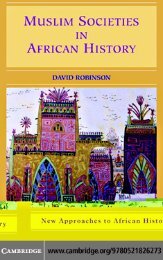personal memories revolutionary states and indian ocean migrations
personal memories revolutionary states and indian ocean migrations
personal memories revolutionary states and indian ocean migrations
Create successful ePaper yourself
Turn your PDF publications into a flip-book with our unique Google optimized e-Paper software.
evolution of the empire between a<br />
constantly negotiated old regime<br />
situation <strong>and</strong> a modernized, centralised<br />
system could indeed have left space for<br />
this option. And examining it is a way<br />
to underline the issues at stake: fiscal<br />
privileges, provincial autonomy, the<br />
financing of the state structure <strong>and</strong> the<br />
evolution of the state personnel. But<br />
here Salzmann’s work also meets what<br />
might be one of its limits: the centrality<br />
in her research of Diyarbakir does not<br />
always allow her, in spite of an excellent<br />
knowledge of the current<br />
historiography, to develop as far as one<br />
would have hoped her important ideas<br />
in the field of world history. And even<br />
at a simply Ottoman scale, conclusions<br />
about eastern Anatolia, though very<br />
important for introducing new<br />
perspectives on the Ottoman centre<br />
itself, would benefit from comparison<br />
<strong>and</strong> cross-examination with other<br />
regions. It is particularly true for the<br />
Arab provinces, where the rhetoric of<br />
imperial belonging was the object of<br />
intensive speculations between the 18 th<br />
<strong>and</strong> the 19 th century. One can, of<br />
course, only be thankful to Ariel<br />
Salzmann for proposing such<br />
interpretations. But engagement with a<br />
broader Ottoman sample is important.<br />
What would also have been important is<br />
an engagement with the new sets of<br />
issues the 19 th century brought about.<br />
Salzmann’s work is clearly<br />
centred on the 18 th century. But her<br />
conclusions <strong>and</strong> the perspectives on<br />
Ottoman modernity would perhaps<br />
have required a broader elaboration of<br />
19 th-century developments.<br />
Tocqueville’s work on the 18 th century<br />
was largely determined by his political<br />
passions of the mid-19 th century. The<br />
first issue is about the Ottoman reforms.<br />
Ariel Salzmann proposes a convincing<br />
interpretation of the Ottoman old<br />
regime. But this very interpretation<br />
would have merited to be contrasted<br />
with the question of state reforms <strong>and</strong><br />
modernity. Because it is now certain that<br />
the very Ottoman modernity of the<br />
http://web.mit.edu/cis/www/mitejmes/<br />
93<br />
tanzimat period was in no way the result<br />
of a mere importation <strong>and</strong> inherited in<br />
many ways impulses that came from the<br />
old-regime situation itself. At the same<br />
time, the limits of the implementation of<br />
Ottoman reforms are sometimes to be<br />
found in the particularities of the<br />
Ottoman old-regime. Many aspects,<br />
then, have to be dealt with: from the<br />
role of the old-regime élite to the nature<br />
of their previously negotiated privileges.<br />
Paths taken are sometimes as telling as<br />
paths not taken. The second issue<br />
Salzmann might have brought out more<br />
clearly is the circulation of<br />
administrative solutions in the Empire.<br />
Some other aspects of the old<br />
regime could also have been the objects<br />
of a particular focus, as Tocqueville’s<br />
work itself suggests. Ariel Salzmann<br />
builds her theory on imperial<br />
governance mainly from the point of<br />
view of fiscal governance. But she<br />
could also have detailed more precisely<br />
some other aspects of old regime<br />
politics <strong>and</strong> their confrontation with<br />
modernity: urban governance, guilds,<br />
the governance of confessional<br />
communities for example. These are all<br />
matters in which the questioning she<br />
proposes brings original arguments to<br />
the table. They allow a more nuanced<br />
vision not only of the characteristics of<br />
the Ottoman old regime, but also of its<br />
passage – sometime problematic<br />
passages – towards modernity. Evoking<br />
Tocqueville could also have suggested<br />
some other questions regarding the<br />
Ottoman condition. Tocqueville’s intent<br />
was not only to underst<strong>and</strong> the<br />
functioning of the old regime, but also<br />
to explain the eruption of modernity. In<br />
that sense, his Ancien régime et la revolution<br />
of 1856 is an exploration of the roots of<br />
modernity. But Tocqueville, two<br />
decades before, also wrote De la<br />
démocratie en Amérique. This essay is also<br />
appealing for conceptual comparativism<br />
of the Ottoman Empire, with questions<br />
such as the birth of a civil society or the<br />
building of a state-apparatus. Ariel<br />
Salzmann, having chosen such an



